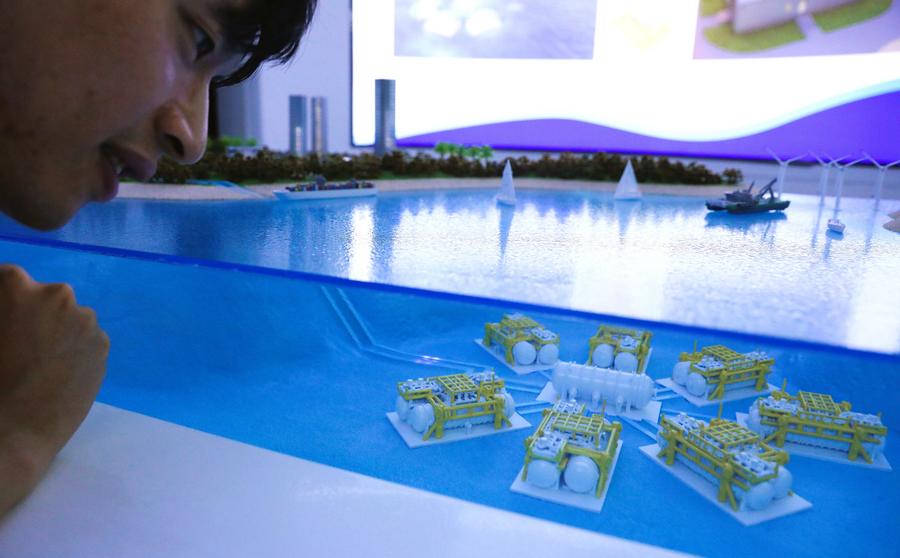


A visitor observes a miniature model of undersea data cabins for an undersea data center, in Lingshui, south China's Hainan Province, Sept. 25, 2025. (Xinhua/Zheng Yue)
HAIKOU, Oct. 10 (Xinhua) -- On a warm evening in Lingshui Li Autonomous County on south China's tropical resort island of Hainan, with the sea breeze gently blowing and coconut tree shadows swaying, Huang Suiyi and Lei Jun, two company executives in the gaming industry, sat in a courtyard where they discussed their mini-game development plans.
Around a year earlier, they had moved their teams from the southern Chinese metropolis of Shenzhen and the eastern city of Xiamen, respectively, to this coastal town in Hainan, which has now become a new hub for Chinese mini-games seeking to "go global."
"In the past, it would take at least half a month to finalize a plan through back-and-forth communication," said Huang, head of Hainan Sanbaijin Technology Co., Ltd. "Now in Lingshui, we can solidify our ideas over a barbecue."
The company's mini-game "Kongfu Nonogram" serves over 50 million users in China and consistently ranks high on game charts. Leveraging Lingshui's digital cultural industry, Huang adapted the game for Southeast Asia, localizing it to better suit the region's tastes.
"We changed the original immortal romance style to a more cute version that appeals to foreign preferences," Huang said. "After its release, it performed exceptionally well in Southeast Asia, especially in Indonesia. The game has nearly 2 million downloads and over 300,000 daily active users on overseas platforms. We plan to create several more games for exports to Southeast Asia this year," Huang added.
Lei moved to Lingshui a bit earlier than Huang, following 10 days of scouting in 2024 that ended with him signing a lease and bringing his family and all development team members to Hainan. "After comparing policies in five places, I found that Lingshui offered the strongest support and the most attention to small and medium-sized enterprises."
Lei's company developed "Kongfu Nonogram" for Huang's company. After learning about local mini-game industry support policies from Lei, Huang also found the business environment in Lingshui very attractive.
Industry-university cooperation and integration of production and education are the hallmarks of Lingshui's gaming sector. Lei's company specializes in mini-game development and has designed a mini-game editor that eliminates the need for complex programming. With just one month of training, ordinary people can design mini-games themselves via this mini-game editor.
In line with Lingshui's industry-university cooperation model, several institutions have established joint training bases with Lei's company. Students, after training, can independently develop mini-games and share profits stemming from hit titles.
"Mini-games don't require users to download them, as they can be played instantly. This also means they need to be updated very frequently. Students can provide many excellent ideas," Lei explained. The Lingshui International Education Park is home to many universities and excellent overseas educational resources. Lei, notably, plans to expand the student internship base further in the coming months -- and hire outstanding graduates directly.
In 2024, Lingshui issued a mini-game industry support policy, aiming to make itself a preferred destination for global mini-game creators to both work and live.
Joining hands with Tencent Cloud, Hainan Mobile and other leading companies, Lingshui established a digital cultural industry cloud platform -- providing direct overseas cloud services and dedicated link infrastructure for game-exporting companies.
Currently, more than 1.16 million overseas gamers have accessed 212 games deployed on Lingshui's cloud servers through undersea cables, said Zhang Liyan, deputy director of the international investment promotion bureau of Lingshui.
In February 2025, in the nearshore waters of Lingshui, an 18-meter-long, 3.6-meter-diameter white "giant canister" -- the data pod of the Hainan Undersea Intelligent Computing Center, steadily sank in the sea to a depth of just more than 30 meters and successfully linked up with a previously established undersea data center.
This undersea data pod can accommodate more than 400 high-performance servers internally. Through a shore station on the nearby land, the data pod is connected to a customer's data end -- establishing a stable data transmission channel, which is expected to further empower the local mini-game export industry, according to local authorities.
An industrial park in Lingshui, where the two business partners now live, has already built a complete closed-loop chain extending from mini-game production to distribution. This park was set up to attract talents that had moved abroad back to China. "Any company can find like-minded partners here to realize their ideas. Our company's latest mini-game is also undergoing final optimization and will be released overseas soon," Lei said when talking about this industrial park.
"Back in the big cities, it was normal to commute for two hours and work late into the night. Now in Lingshui, it only takes 10 minutes to get home. The sea breeze dispels my fatigue and the sound of the waves has become the rhythm of my inspiration," Lei added.
点击右上角![]() 微信好友
微信好友
 朋友圈
朋友圈

请使用浏览器分享功能进行分享
